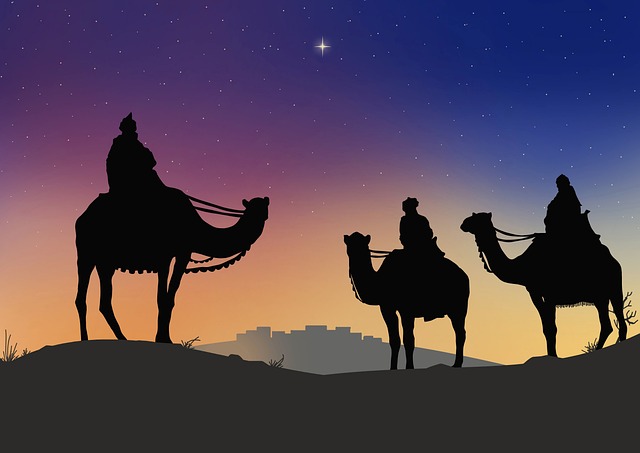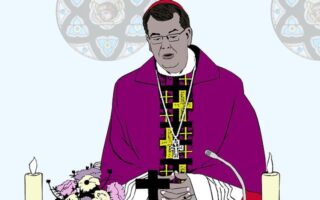In the Catholic Church, an epiphany refers to the manifestation of Jesus Christ to the Gentiles, represented by the visit of the Magi to the infant Jesus. This event is celebrated on January 6th, also known as the Feast of the Epiphany or Three Kings Day. It is a significant feast day in the liturgical calendar that commemorates the revelation of Jesus as the Son of God and Savior of the world.
Table of Contents
Importance of Epiphany in Catholic Church
Epiphany is a significant celebration in the Catholic Church that commemorates the revelation of Jesus Christ to the Gentiles, represented by the visit of the Magi to the infant Jesus. This feast day falls on January 6th, twelve days after Christmas, and marks the end of the Christmas season. The word “epiphany” comes from the Greek word epiphaneia, which means manifestation or appearance. It is a time to reflect on the manifestation of Jesus as the Savior of all people, not just the Jews.
The story of the Magi visiting Jesus is found in the Gospel of Matthew. According to the biblical account, the Magi, who were wise men from the East, followed a star that led them to Bethlehem, where they found the newborn King of the Jews. They presented him with gifts of gold, frankincense, and myrrh, symbolizing his kingship, divinity, and sacrificial death. The visit of the Magi is seen as a fulfillment of the prophecy in Isaiah 60:3, which says, “Nations will come to your light, and kings to the brightness of your dawn.”
The importance of Epiphany in the Catholic Church lies in its message of inclusivity and universality. The revelation of Jesus to the Gentiles signifies that salvation is available to all people, regardless of their background or nationality. It emphasizes the idea that Jesus came not just for a select few, but for the whole world. This message is particularly relevant in today’s diverse and multicultural society, where people from different cultures and religions come together to celebrate their faith.
Epiphany is also a time to reflect on the light of Christ shining in the darkness of the world. The star that guided the Magi to Jesus symbolizes the light of Christ that illuminates our path and leads us to salvation. It reminds us that even in the midst of darkness and uncertainty, there is hope and redemption in Christ. This message is especially comforting during times of struggle and hardship when we may feel lost or alone.
In addition to its spiritual significance, Epiphany is also a time of celebration and joy in the Catholic Church. It is a time to exchange gifts, share meals with loved ones, and participate in festive traditions. In many cultures, Epiphany is associated with the custom of blessing homes with holy water and chalk, marking the doorways with the initials of the Magi (C+M+B) and the year as a symbol of protection and prosperity.
Overall, Epiphany holds a special place in the hearts of Catholics around the world as a time to remember the universal message of Christ’s love and salvation. It is a reminder that Jesus came not just for a select few, but for all people, regardless of their background or circumstances. As we celebrate Epiphany each year, let us be inspired by the example of the Magi who followed the star to find Jesus and be guided by the light of Christ in our own lives. May we always remember that the message of Epiphany is one of hope, joy, and inclusivity for all.
History and Origins of Epiphany
Epiphany, also known as Three Kings’ Day or Theophany, is a Christian feast day that celebrates the revelation of God incarnate as Jesus Christ. In the Catholic Church, Epiphany is observed on January 6th, twelve days after Christmas. This holiday has a rich history and deep spiritual significance that dates back to the early days of Christianity.
The word “epiphany” comes from the Greek word epiphaneia, which means manifestation or appearance. The feast of Epiphany commemorates the visit of the Magi, or Wise Men, to the infant Jesus in Bethlehem. According to the Gospel of Matthew, the Magi followed a star to find the newborn King of the Jews and presented him with gifts of gold, frankincense, and myrrh. This event symbolizes the revelation of Jesus as the Savior of all people, not just the Jewish nation.
The origins of Epiphany can be traced back to the Eastern Church, where it was initially celebrated as a single feast day that included the birth of Jesus, the visit of the Magi, and the baptism of Jesus by John the Baptist. Over time, the Western Church separated these events into distinct feast days, with Epiphany focusing specifically on the visit of the Magi.
In the early centuries of Christianity, Epiphany was a major celebration that rivaled Christmas in importance. It was a time of great joy and festivity, marked by processions, feasting, and the exchange of gifts. In some cultures, Epiphany was even more popular than Christmas, with elaborate pageants and reenactments of the Magi’s journey to Bethlehem.
As the centuries passed, the observance of Epiphany evolved and changed. In the Middle Ages, Epiphany became associated with the blessing of water and the baptism of new converts. In some regions, it was customary to hold outdoor processions to bless rivers, lakes, and wells. This tradition symbolized the cleansing and purifying power of baptism, as well as the renewal of the earth in preparation for the coming of spring.
Today, Epiphany is still celebrated in many Catholic countries around the world, though its observance varies from place to place. In some regions, Epiphany is a public holiday with parades, parties, and special church services. In others, it is a more solemn occasion marked by prayer, reflection, and acts of charity.
Regardless of how it is celebrated, Epiphany remains a time of spiritual significance for Catholics everywhere. It is a reminder of the universal nature of God’s love and the call to share that love with all people. As we commemorate the visit of the Magi to the infant Jesus, we are reminded that Christ came not just for a select few, but for all humanity. This message of inclusivity and compassion is at the heart of the Epiphany celebration and continues to inspire believers around the world.
Symbolism of the Three Wise Men in Epiphany

Epiphany is a significant feast day in the Catholic Church that celebrates the revelation of Jesus Christ to the Gentiles, represented by the visit of the Three Wise Men to the infant Jesus. This event is also known as the Feast of the Three Kings or the Feast of the Magi. The word “epiphany” comes from the Greek word “epiphaneia,” which means manifestation or appearance. It is a time to reflect on the manifestation of Jesus as the Savior of all people, not just the Jews.
The Three Wise Men, also known as the Magi or the Three Kings, are central figures in the story of Epiphany. According to the Gospel of Matthew, they followed a star to Bethlehem, where they found the newborn Jesus and presented him with gifts of gold, frankincense, and myrrh. These gifts are rich in symbolism and carry deep spiritual meaning.
Gold is a precious metal that symbolizes kingship and wealth. By offering gold to Jesus, the Three Wise Men acknowledged him as a king, recognizing his divine authority and sovereignty. This gift also foreshadowed Jesus’ role as the King of Kings and Lord of Lords.
Frankincense is a fragrant resin that was used in ancient religious rituals as a symbol of prayer and worship. By presenting frankincense to Jesus, the Three Wise Men honored him as a priest, acknowledging his role as the mediator between God and humanity. This gift also symbolizes the divinity of Jesus and his connection to the heavenly realm.
Myrrh is a fragrant resin that was used in ancient times for embalming and burial rituals. By giving myrrh to Jesus, the Three Wise Men foreshadowed his sacrificial death on the cross and his role as the Savior of the world. This gift symbolizes the suffering and death that Jesus would endure for the redemption of humanity.
The gifts of the Three Wise Men are not just material offerings; they are also symbolic gestures of faith, reverence, and devotion. They represent the Three Wise Men’s recognition of Jesus as the Messiah, the Son of God, and the Savior of all people. The story of the Three Wise Men reminds us that Jesus came not just for a select few, but for all people, regardless of their background or nationality.
As we celebrate Epiphany, we are called to reflect on the significance of the Three Wise Men’s visit to Jesus and the symbolism of their gifts. We are reminded of Jesus’ universal message of love, forgiveness, and salvation for all people. Just as the Three Wise Men recognized Jesus as the King of Kings, the High Priest, and the Savior of the world, we too are invited to acknowledge Jesus as our Lord and Savior and to offer him the gifts of our hearts, minds, and lives.
May the story of the Three Wise Men inspire us to seek Jesus with faith, humility, and reverence, and to offer him the gift of our whole selves in worship and adoration. May we, like the Three Wise Men, be guided by the light of Christ and be transformed by his love and grace. Amen.
Traditions and Celebrations of Epiphany in Catholic Church
Epiphany is a significant celebration in the Catholic Church that commemorates the revelation of Jesus Christ to the Gentiles, represented by the visit of the Magi to the infant Jesus. This feast day falls on January 6th, twelve days after Christmas, and marks the end of the Christmas season. The word “epiphany” comes from the Greek word meaning “manifestation” or “appearance,” emphasizing the revelation of Jesus as the Son of God to all people.
Traditionally, Epiphany is celebrated with various customs and traditions in the Catholic Church. One of the most well-known traditions is the blessing of homes with chalk. This practice involves marking the doorways of homes with the initials of the Magi (Caspar, Melchior, and Balthazar) and the year, along with the phrase “Christus Mansionem Benedicat,” which means “May Christ bless this house.” This blessing is believed to protect the home and its inhabitants throughout the year.
Another common tradition associated with Epiphany is the blessing of water. This ritual symbolizes the baptism of Jesus in the Jordan River and is often performed during Mass on Epiphany. The blessed water is then used throughout the year for various sacramental purposes, such as sprinkling on people and objects to invoke God’s protection and blessing.
In some cultures, Epiphany is celebrated with special foods and dishes. In Spain, for example, it is traditional to eat a special cake called Roscón de Reyes, or King’s Cake, which is often filled with cream or fruit and topped with candied fruits. A small figurine of the baby Jesus is hidden inside the cake, and whoever finds it is said to have good luck for the coming year.
In Italy, the celebration of Epiphany is known as La Befana, where children eagerly await the arrival of the Befana, a kind old witch who delivers gifts to good children and coal to naughty ones. This tradition is based on the legend of the Befana, who was visited by the Magi on their journey to find the Christ child but declined to join them. Regretting her decision, she now travels the world on Epiphany night, leaving gifts for children in hopes of finding the Christ child.
Overall, Epiphany is a joyous and festive celebration in the Catholic Church that highlights the universal nature of Christ’s message of salvation. It reminds us that Jesus came not only for the chosen people of Israel but for all people, regardless of their background or nationality. As we mark this special feast day, let us reflect on the significance of the Epiphany and the message of hope and salvation it brings to all. May we be inspired to share the light of Christ with others and to seek out the presence of God in our daily lives.
Epiphany and its significance in the liturgical calendar
Epiphany is a significant feast day in the Catholic Church that celebrates the revelation of Jesus Christ to the Gentiles, represented by the visit of the Magi to the infant Jesus. This feast day falls on January 6th, twelve days after Christmas, and marks the end of the Christmas season. The word “epiphany” comes from the Greek word epiphaneia, which means manifestation or appearance. It is a time to reflect on the manifestation of Jesus as the Savior of all people, not just the Jews.
The story of the Magi visiting Jesus is found in the Gospel of Matthew. According to the biblical account, the Magi, who were wise men from the East, followed a star that led them to Bethlehem, where they found the newborn King of the Jews. They presented him with gifts of gold, frankincense, and myrrh, symbolizing his kingship, divinity, and eventual sacrifice. The visit of the Magi is seen as a fulfillment of the prophecy that all nations would come to worship the Messiah.
Epiphany is also known as Three Kings Day or Twelfth Night, and in some cultures, it is a day of gift-giving and feasting. In many Latin American countries, children receive gifts from the Three Kings, rather than from Santa Claus. In Spain, it is traditional to eat a special cake called Roscón de Reyes, which contains a hidden figurine of the baby Jesus. Whoever finds the figurine is said to have good luck for the coming year.
In the liturgical calendar, Epiphany is a time of light and revelation. The star that guided the Magi to Jesus is a symbol of the light of Christ shining in the darkness. It is a reminder that Jesus came to bring light to a world that was lost in sin and darkness. The feast of Epiphany is a call to all believers to be a light to the world, sharing the good news of Jesus with others and reflecting his love and compassion to those in need.
Epiphany is also a time to reflect on the mission of the Church to proclaim the gospel to all nations. The visit of the Magi reminds us that Jesus came not just for a select few, but for all people, regardless of their background or nationality. The Church is called to be a welcoming and inclusive community, reaching out to those who are marginalized or forgotten.
As we celebrate Epiphany, we are reminded of the importance of seeking Christ in our own lives. Just as the Magi searched for the newborn King, we are called to seek Jesus in the midst of our daily lives, in the faces of those we meet, and in the sacraments of the Church. Epiphany is a time to renew our commitment to following Christ and to sharing his love with others.
In conclusion, Epiphany is a joyful feast day that celebrates the revelation of Jesus Christ to the world. It is a time to reflect on the light of Christ shining in the darkness, the mission of the Church to proclaim the gospel to all nations, and our own call to seek Christ in our lives. May we be inspired by the example of the Magi to follow Jesus with faith and devotion, bringing his light and love to all those we encounter.
Conclusion
In the Catholic Church, an epiphany is a manifestation or revelation of God’s presence or power. It is often associated with the visit of the Magi to the infant Jesus, symbolizing the revelation of Christ to the Gentiles. Epiphany is celebrated on January 6th and is considered one of the major feast days in the liturgical calendar.


